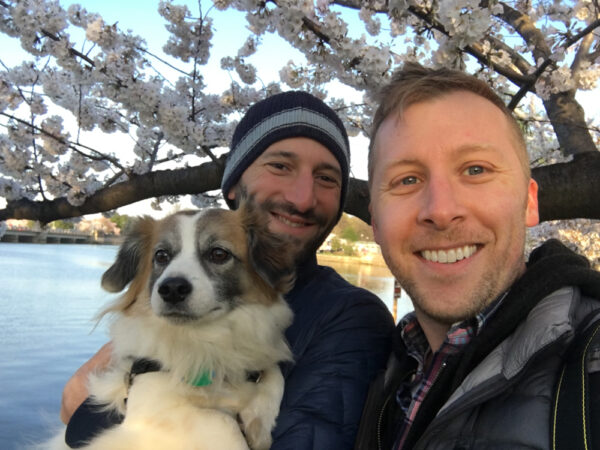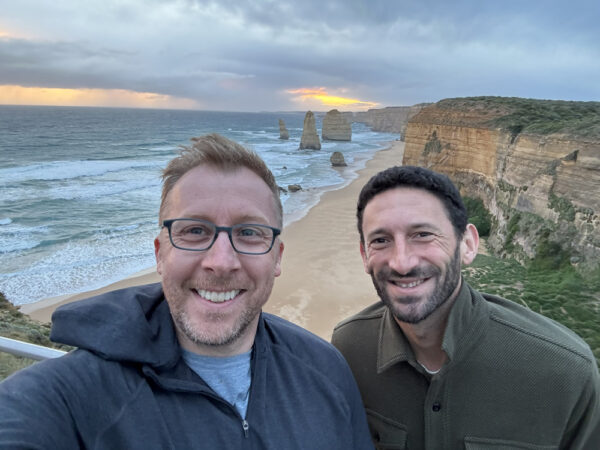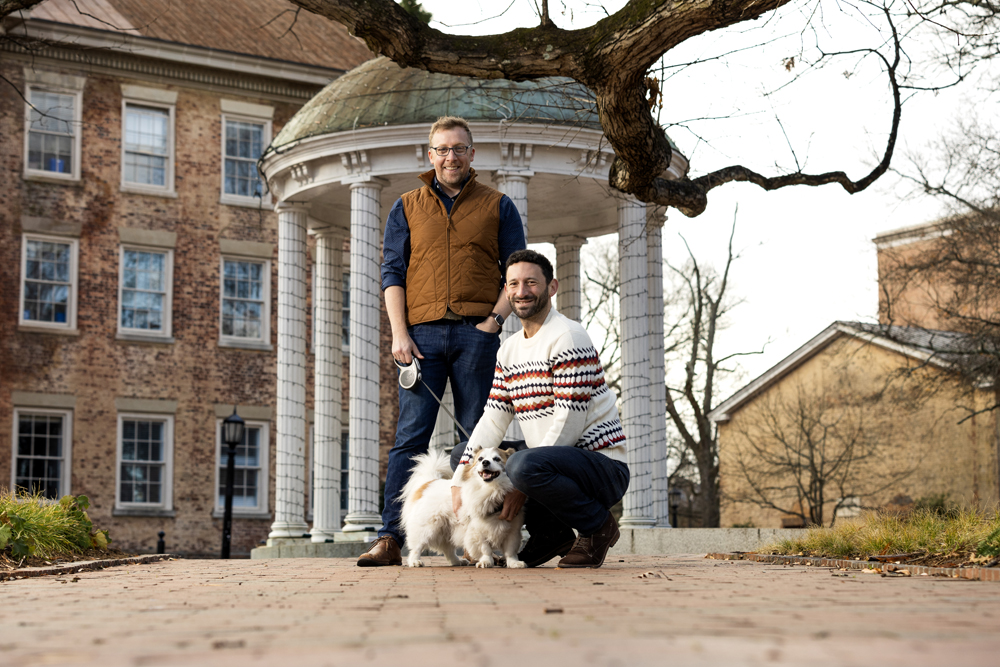Most Sunday mornings, Ethan Hutt and Daniel Klasik can be found walking their dog Holtby across UNC-Chapel Hill’s campus. They value traditions like this and have many, from cooking dinner together almost every night to faithfully watching Tottenham Hotspur soccer games to celebrating their first big cross-country move each year on August 8 by drinking “good wine in bad cups.”
“While living in the Bay area, we had an expensive habit of going to Napa and Sonoma,” Klasik shares. “We had nice wine that we couldn’t put in the moving truck, and we were at our new house waiting for the truck to arrive. So we opened up our good wine and were drinking it out of these bad plastic cups because it’s all we had.”
Moving to a new state, let alone across the country, can be challenging for couples, but Hutt and Klasik had spent the previous six years navigating the rigors of academia together. The couple met in 2007 when they both enrolled in Stanford University’s education PhD program. Their cohort would often meet up to study or to lament their demanding course load over drinks. It didn’t take long for Hutt and Klasik to cement their connection.
“Ethan was my trauma buddy,” Klasik says with a laugh. “I told him in the beginning that this needs to work. Because if I didn’t have him to lean on in this program, I was in trouble.”
“We knew if we could make it through grad school together, we’d be okay as a couple,” Hutt adds.
While both worked toward PhDs in education, they pursued different foci: Hutt history and Klasik economics.
“We were interested in the same content, but our questions were radically different,” Hutt says. “And that was kind of interesting. I could have read the same paper as Daniel 10 times, and I wouldn’t come up with his set of questions.”
Most of their PhD program was spent working alongside each other in their tiny, one-bedroom apartment — a testament to the strength of their relationship.
Today, Hutt and Klasik are both professors within the UNC School of Education. Hutt studies the measures that have been developed to assess students and schools, and Klasik researches college access and outcomes. Together they powered through six years of graduate school, two major job searches, and a cross-country move. Both joined the Carolina faculty in 2019.
“We’ve always been pretty good about finding boundaries and balance,” Hutt says.
Finding education — and each other
When Hutt was a kid, he never would have guessed that he’d follow in the footsteps of his mother, a public-school teacher. Seemingly destined to become a lawyer like his dad, he attended Yale University and majored in history, a common path for pursuing a law degree.
For his senior thesis project, he researched bilingual education in Connecticut in the 1880s, a time when many Italians were coming to New Haven. He was fascinated to learn that teachers attempted to speak to students in their native tongue, but the Italians had so many different dialects that the program was ultimately unsuccessful.
“I just got into it. Some friends and I were really passionate about youth activism and started working in the local schools in New Haven and in Connecticut, helping students work with their school boards to focus on issues important to them,” says Hutt, who went on to co-found and co-direct a nonprofit focused on elevating student voices.
At that same time in 2005, Klasik was deviating from his plans as well: working as an admissions officer for Vassar College in Poughkeepsie, New York. He graduated from Williams College with degrees in mathematics and psychology, under the assumption that he’d keep pursuing math simply because he was good at it.
But during college, he spent a few summers working as a tour guide within the admissions office and really enjoyed talking to prospective students and their families. Unsure of what he wanted to do after graduation, he applied for the job at Vassar.
“That pretty much launched my entire research agenda,” Klasik says. “Part of the work of the admissions officers is traveling around the country recruiting students and visiting different high schools. It’s just so fascinating to see the different perspectives that students brought to their college search.”
These experiences led Klasik and Hutt to pursue graduate studies in education — and both headed to Stanford in 2007.
California to Carolina
After graduating in 2013, Hutt and Klasik each had job offers at research universities in different parts of the U.S. They decided they didn’t want to live apart and sought counsel from their academic mentors, who encouraged them to pick a place where the other person’s skill set could land them a job.

Ethan, Daniel, and Holtby at the Cherry Blossom Festival when they lived near Washington, D.C. (photo courtesy of Ethan Hutt & Daniel Klasik)
They settled on Hutt’s offer at the University of Maryland because Klasik could pursue a postdoctoral research position there while searching for other opportunities nearby in Washington D.C. After just one year, Klasik landed an assistant professorship at George Washington University.
By 2019, both researchers were on a tenure track at their respective institutions. But then a colleague reached out, encouraging them to apply for two open professor positions within the UNC School of Education.
“We were definitely not on the market,” Klasik clarifies. “But we were excited about the colleagues at UNC. They were just so enthusiastic about working in public education and living in this area. We felt like we had to apply.”
“And we already had so much experience being in the same environment. We have different views and research agendas, so we didn’t think it would be awkward. In fact, I think some people are surprised to know we’re married,” Hutt adds with a laugh.
Grades, tests, and college access
Now at Carolina, Hutt is an education historian who studies how school quality is evaluated and communicated. To do this, he researches everything from grading and testing history to teacher evaluations to laws that require schools to report their ratings.
“History is everywhere, especially in schools,” Hutt shares. “You can see and feel the evolution of a school. So many students pass through them and they’re such an important part of their early life experiences.”
In 2023, he and his longtime collaborator Jack Schneider co-authored a book that Hutt feels is the culmination of a decade of research. “Off the Mark: How Grades, Ratings, and Rankings Undermine Learning (but Don’t Have To)” unpacks the history of U.S. grading systems and how tests can be used to bolster student success.
“People love talking about test scores and grades and how students are doing and if we can do better,” Hutt says. “We definitely can if we can acknowledge both the very real need for assessment and the need to provide spaces for students to learn and grow without worrying if it will go on their permanent record.”
As an economist and policy expert, Klasik focuses on higher education institutions, specifically who has access to them, who will graduate successfully, and the policies to help students succeed. He also studies how race and socioeconomic status impact the college student experience and admissions process.
“Some of that is looking at the barriers we create in the admissions processes when students apply to selective colleges. Some of it is about the geography of access to college, like going to college close to home. And now I’m starting to think a little bit more about student success in college as they move through it,” Klasik says.
His research suggests that to successfully enroll in college high school students must complete these essential steps: maintain the aspiration to earn a four-year degree from 10th through 12th grade, take the SAT or ACT, meet the minimal college qualifications, and actually apply to college.
More recently, Klasik’s research on how affirmative action affects college student diversity was cited in several write-ups from experts to provide insight for Supreme Court decisions. In their work, he and his colleagues found that alternatives to race-conscious affirmative action like targeted recruiting and affirmative action based on socioeconomic status would likely reduce diversity at institutions that lack race-based policies.
More locally, Klasik has also studied the effects of NC Promise, a tuition reduction policy for Elizabeth City State University, UNC Pembroke, and Western Carolina University. The data suggest that the policy led to an increase in transfer student enrollment and that students took out fewer student loans. It was particularly beneficial for middle-earning families who don’t qualify for as much need-based financial aid but also can’t afford the cost of full tuition.
Unexpected collaborations
While Hutt and Klasik often credit their success to the fact that they work on different topics, they have uncovered a few opportunities for collaboration. This includes a paper assessing college quality.
“You can tell which parts are mine. I wrote the introduction,” Hutt says with a smirk. “The data, the hard empirical stuff, is Daniel’s.”

Daniel and Ethan love to travel and often attend conferences together. While attending a conference in Australia, they visited the Great Ocean Road, a scenic drive that winds along the coast. (photo courtesy of Ethan Hutt & Daniel Klasik)
Then, in 2021, they received a National Science Foundation grant to study how college course grading changed during the pandemic. Using data from the UNC System, they’re assessing how students reacted to their grades within science, technology, engineering, and mathematics (STEM) courses and how those reactions affected their trajectories as STEM majors.
“For example, women perceive grade information differently from men,” Hutt says. “So even if they get the same grade in a class, say a ‘B,’ they may not persist in their major, whereas the men will keep going. So we’re really interested in pulling that apart in the context of the pandemic.”
Even though grading methods became more relaxed and flexible during the pandemic, they found that students who performed poorly were more likely to shrug it off while those who performed well behaved the same.
“Students seem happy to take credit for good grades, but are better at contextualizing bad grades,” Klasik says.
While working together isn’t always seamless, Hutt and Klasik acknowledge their years of experience working alongside one another within tightknit communities — and often side-by-side in a shared home office.
“We take it seriously,” Hutt says. “I don’t think we’re competitive with each other, but we want to do and be known for good work that benefits students and educators. And we try to communicate that to our students.”
“We have to make sure we continue to do the work, but it can’t be all-consuming,” Klasik adds. “So that’s been something we share: finding balance.”


